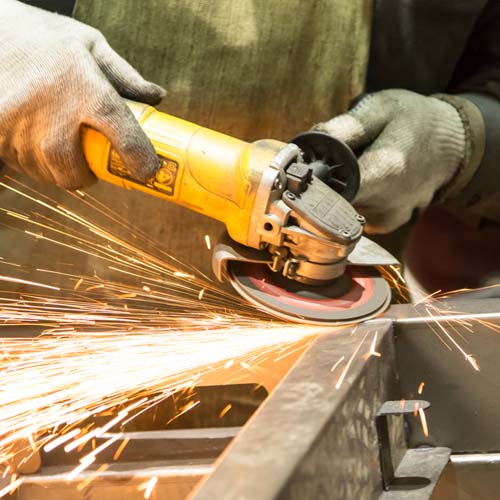Abrasive Wheels Courses
Occupli Training is a leading provider of Abrasive Wheels training courses.
Abrasive Wheels Courses
We deliver operators courses. In addition we also provide instructor courses. Both on a regular basis. Required under legislation, which was deemed necessary due to the serious injuries and fatalities resulting from the use of machines that were subjected to inappropriate use or incorrect mounting procedures.
The Safety, Health and Welfare at Work Act 2005 (Section 2 covers competency and demands training for all such activities) and The Safety in Industry Act 1882 (Schedule No. 30 (Abrasive Wheels) places an obligation on all employers where Abrasive Wheels are in use, to ensure that only trained, competent and appointed personnel mount the appropriate wheels in the machines.
Abrasive Wheels
Abrasive Wheels Instructor
Can’t find what you’re looking for?
Abrasive Wheel Training: Ensuring Safety and Efficiency in the Workplace
Abrasive wheels are widely used in various industries for cutting, grinding, and polishing tasks. However, using abrasive wheels without proper training can pose significant risks to workers and compromise workplace safety.
- The Need for Training in Using Abrasive Wheels
Using abrasive wheels without proper training can lead to serious accidents and injuries.
Without adequate knowledge and understanding of the potential hazards, workers may unknowingly engage in unsafe practices.
The absence of training can increase the risk of accidents such as wheel breakages, flying debris, and operator injuries. It is crucial for employers to prioritize abrasive wheel training to mitigate these risks and ensure the safety of their employees.
There are legal requirements and regulations in regard to authorisation and training that mandate abrasive wheel training. (Safety, Health and Welfare at Work (General Application) (Amendment) Regulations 2016, Part 12, Abrasive Wheels).
Compliance with these requirements not only helps businesses avoid penalties but also demonstrates a commitment to creating a safe working environment.
By providing comprehensive training, employers can meet their legal obligations and protect their workforce.
- What is Abrasive Wheels Training?
Abrasive wheel training is a specialised programme designed to educate individuals on the safe and proper use of abrasive wheels.
The training covers various topics, including wheel selection, mounting and guarding, marking and identification, inspection and maintenance, and practical applications of abrasive wheels.
The purpose of this training is to enhance the participants’ understanding of abrasive wheels, equip them with the necessary knowledge to identify and mitigate risks and promote safe practices in the workplace.
During abrasive wheel training, participants will learn about the different types of abrasive wheels, their composition, and their appropriate applications. They will also gain insights into the potential hazards associated with improper wheel selection and usage. Additionally, the training will provide guidance on how to properly mount and guard abrasive wheels to prevent accidents and injuries.
- Becoming an Abrasive Wheel Trainer
Becoming an abrasive wheel trainer requires specific qualifications and certifications to ensure competence in delivering effective training. Training programmes and courses are available for individuals interested in pursuing a career as abrasive wheel trainers. These programs typically cover topics such as adult learning principles, instructional techniques, and comprehensive knowledge of abrasive wheel safety practices.
Upon successful completion of a trainer certification program, individuals will acquire the necessary skills and knowledge to effectively train others on abrasive wheel safety. Becoming a certified trainer allows individuals to contribute to workplace safety by imparting their expertise and helping others understand the importance of proper abrasive wheel usage.
What the Abrasive Wheel Training Covers
- Selecting the Right Abrasive Wheel
One of the key components of abrasive wheel training is understanding the importance of selecting the correct wheel for specific tasks. Different abrasive wheels are designed for specific applications, and using the wrong wheel can lead to inefficiency and safety hazards. During training, participants will learn about the various types of abrasive wheels available, such as grinding wheels, cutting wheels, and wire brushes. They will also learn how to identify the appropriate wheel for different materials and tasks.
- Mounting and Guarding Abrasive Wheels
Proper mounting and abrasive wheels guarding are crucial to prevent accidents and injuries. During abrasive wheel training, participants will learn safe mounting techniques to ensure the wheel is securely attached to the machine. This includes understanding the correct size and type of mounting flanges, as well as the proper tightening procedure.
In addition to mounting, participants will also learn about the importance of guards in abrasive wheel safety. Guards serve as a protective barrier between the operator and the wheel, preventing contact with the rotating abrasive surface. Abrasive wheel training covers the different types of guards available and how to effectively use them for various tasks.
- Marking and Identifying Abrasive Wheels
Proper marking and identification of abrasive wheels are essential for maintaining safety and efficiency in the workplace. Abrasive wheel training will educate participants on the significance of marking wheels with important information such as the manufacturer’s name, wheel type, and maximum operating speed. This ensures that operators are aware of the wheel’s specifications and limitations.
- Inspecting and Maintaining Abrasive Wheels
Regular inspection and maintenance of abrasive wheels are necessary to ensure their safe and effective operation. Abrasive wheel training will teach participants the proper procedures for inspecting wheels before each use, as well as how to identify signs of damaged wheels or wear.
Inspecting abrasive wheels includes checking for cracks, chips, and other visible defects that could compromise the wheel’s integrity. Participants will also learn how to assess the condition of the bonding agent and abrasive grains to determine if the wheel needs to be replaced.
Practical Applications of Abrasive Wheel Training
- Working with Angle Grinders and Bench Grinders
Angle grinders and bench grinders are common tools used in various industries for cutting, grinding, and polishing tasks. However, they can be extremely dangerous if not used properly. It is crucial for individuals to receive proper abrasive wheel training to ensure their safety while working with these tools.
During abrasive wheel training, participants learn about the safety precautions and techniques specific to bench and angle grinders. They are taught how to handle these tools accurately and securely, reducing the risk of accidents or injuries. Understanding the appropriate wheel to use for different tasks is also covered in the training, as using the correct wheel is essential for optimal performance and safety.
- Cutting Operations and Disc Cutting
Cutting operations when working with abrasive wheels requires specific techniques to maintain safety and achieve desired results. Abrasive wheel training covers these techniques in detail, ensuring individuals understand the correct procedures.
One important aspect of cutting operations is the proper use of discs. Different types of discs are designed for specific materials and tasks, and it is crucial to select the appropriate disc for the job at hand. During abrasive wheel training, participants learn about the different types of discs available and how to choose the right one for tasks.
- Dressing and Fine Polishing
Abrasive wheels require regular dressing to maintain their effectiveness and prolong their lifespan. Dressing involves removing debris and reshaping the wheel to restore its cutting or grinding surface. Abrasive wheel training covers dressing techniques to ensure individuals can properly maintain their wheels.
Fine polishing is another application where abrasive wheels are used. This process involves achieving a smooth and polished surface on materials such as metal or stone. Abrasive wheel training provides individuals with the necessary knowledge and techniques to perform fine polishing effectively and achieve the desired results.
Invest in your future with our industry-leading training. Enroll today and take the first step toward a brighter tomorrow!


